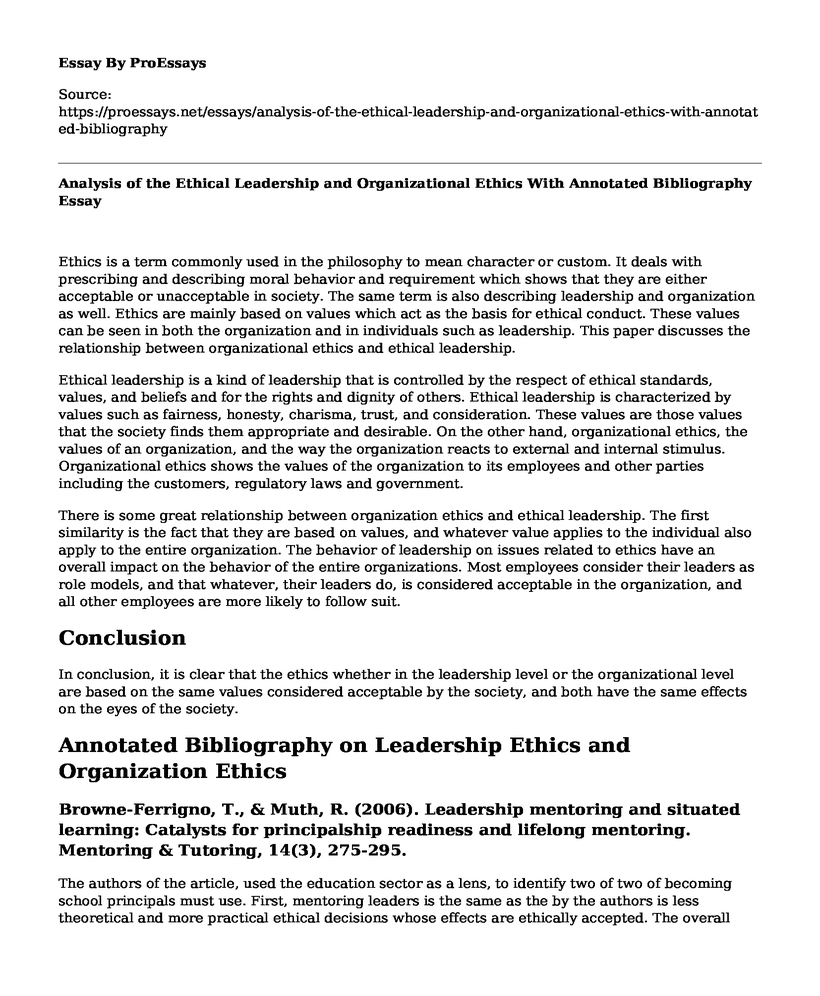Ethics is a term commonly used in the philosophy to mean character or custom. It deals with prescribing and describing moral behavior and requirement which shows that they are either acceptable or unacceptable in society. The same term is also describing leadership and organization as well. Ethics are mainly based on values which act as the basis for ethical conduct. These values can be seen in both the organization and in individuals such as leadership. This paper discusses the relationship between organizational ethics and ethical leadership.
Ethical leadership is a kind of leadership that is controlled by the respect of ethical standards, values, and beliefs and for the rights and dignity of others. Ethical leadership is characterized by values such as fairness, honesty, charisma, trust, and consideration. These values are those values that the society finds them appropriate and desirable. On the other hand, organizational ethics, the values of an organization, and the way the organization reacts to external and internal stimulus. Organizational ethics shows the values of the organization to its employees and other parties including the customers, regulatory laws and government.
There is some great relationship between organization ethics and ethical leadership. The first similarity is the fact that they are based on values, and whatever value applies to the individual also apply to the entire organization. The behavior of leadership on issues related to ethics have an overall impact on the behavior of the entire organizations. Most employees consider their leaders as role models, and that whatever, their leaders do, is considered acceptable in the organization, and all other employees are more likely to follow suit.
Conclusion
In conclusion, it is clear that the ethics whether in the leadership level or the organizational level are based on the same values considered acceptable by the society, and both have the same effects on the eyes of the society.
Annotated Bibliography on Leadership Ethics and Organization Ethics
Browne-Ferrigno, T., & Muth, R. (2006). Leadership mentoring and situated learning: Catalysts for principalship readiness and lifelong mentoring. Mentoring & Tutoring, 14(3), 275-295.
The authors of the article, used the education sector as a lens, to identify two of two of becoming school principals must use. First, mentoring leaders is the same as the by the authors is less theoretical and more practical ethical decisions whose effects are ethically accepted. The overall approach used an experienced leader to know how to ethically respond to daily challenges and make general principles used in mentoring in all fields, but the second factors are the use of on-the-job training.
Brown, M. E., Trevino, L. K., & Harrison, D. A. (2005). Ethical leadership: A social learning perspective for construct development and testing. Organizational behavior and human decision processes, 97(2), 117-134.
The authors used a mixture of seven different research to explain the topic of ethical leadership and organizational ethics. The authors refined and came up with a measure to understand the extent of impacts a leader has on the organization ethics based on employee ability to make ethical decisions under the influence of their leader. In this article, a leader is seen as a role model whose ethical behavior and decisions influences the employees and promotes their dedication, effectiveness and job satisfaction thus promoting organizational ethics.
Goleman, D., Boyatzis, R., & McKee, A. (2013). Primal Leadership: Unleashing the Power of Emotional Intelligence. Harvard Business Press.
The authors look at strategies to imbue a team, organization or a group with more emotional intelligence. The authors identified the reason why leadership building programs fail. All these five reasons have their root cause from the fact that the company focuses on the individual emotional intelligence in such a way that they are too disconnected from the entire culture of the organization.
MacDonald, C. (2013). Ethical Leader as Ethics Coach. In Kimmel, BB, Trust Inc. 117-122. Next Decade Inc.
The authors understand leadership as an ethical barometer used by employees to measure their own ethical decision making within an organization. The authors identify three main methods used by leaders to promote ethics in leaders-in-training, by acting as ethics coach, free communication with the employee on issues concerning ethical dilemmas in an organization and willing to propose that conversation with other parties. Empowered employees are in a better position to promote organizational ethics even after an ethical leader has departed.
Ofori, G. (2009). Ethical leadership: Examining the relationships with the full range leadership model, employee outcomes, and organizational culture. Journal of Business Ethics, 90(4), 533-547.
The author makes a clear distinction between transactional and ethical leadership styles, as an attempt to promote positive workers performance and organizational ethics to the use of leadership ethics in the organization. The authors used a quantitative approach by studying the survey data from the construction industry in Singapore. The author draws the relationship between ethical leadership and organizational ethics.
Cite this page
Analysis of the Ethical Leadership and Organizational Ethics With Annotated Bibliography. (2022, Oct 06). Retrieved from https://proessays.net/essays/analysis-of-the-ethical-leadership-and-organizational-ethics-with-annotated-bibliography
If you are the original author of this essay and no longer wish to have it published on the ProEssays website, please click below to request its removal:
- Position Leadership Succession Planning Report
- Paper Example on Saudi Aramco Collaborative Leadership Style for Sustainability
- Leader Rewards and Punishment Behavior Essay
- Expected Outcomes of Application of Changes to Substitute Teachers Management (MOE)
- Project Management 18 Reflection Paper Example
- Essay on Organizations Need to Adjust: Business Ops Mgmt for Long-Term Success
- Essay Example on Contract File Management: Uncovering Significant Vulnerabilities







